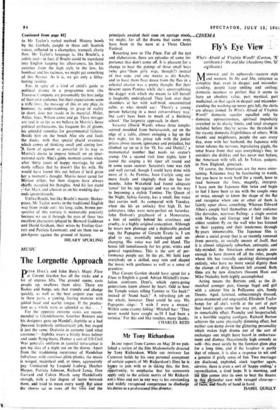Fly's Eye View
Who's Afraid of Virginia Woolf? (Curzon, 'X' certificate.)—He and She. (Academy One, '1,1' ceitificate.) MARRIAGE and its upheavals—eastern style and western. In He and She, reticence so complete that, even in despair and misunder-
standing, people keep smiling and smiling; domestic neatness so perfect that it seems to have an absolute value, part mystical, part medicinal, so that again in despair and misunder- standing the washing-up never gets left, the shirts
* are always ironed. In Who's Afraid of:Virginia Woolf? domestic squalor equalled only by
• domestic uproariousness, spiritual impudicity stretched to its elastic limits, and total strangers included before they're across the threshold in the steamy domestic frightfulness of others. With friends and neighbours, people she sees every day, even with her husband, the Japanese wife , never relaxes the nervous, ingratiating giggle, the tense brave front that says everything's fine; to outsiders she dislikes and has never met before, the American wife tells all. In Tokyo, gadgets: in New England, gimcrack.
Of course, the Americans are the more enter- taining. Reticence may be fascinating to watch, but you have to work hard for a result, have to read between the lines, magnify, interpret. I have seen the Japanese film twice and begin ▪ to feel I have been to tea with the couple once or twice, enough to know the shape of the flat and recognise when one or other of them is faintly upset about something. Whereas Edward Albee's couple hurl themselves at their audience like dervishes, neuroses flailing: a single session with Martha and George and I feel like the • oldest resident fly on the wall who has listened to their yapping and their tenderness. through fly-years innumerable. The Japanese film is about a social group that is so recently removed from poverty, so socially unsure of itself, that it is almost religiously suburban, antiseptic, and tidy-minded; the American about people sure enough to have thrown off all the rules, people whose life has (socially speaking) disintegrated entirely, who have no more social dignity than the clumps of dirty Kleenex left around. Both films are by new directors (Susumi Hani and Mike Nichols), both highly accomplished. Acting means the Burtons and, as the ill- matched younger pair, George Segal and girl with a sinister line in Pollyanna airs, Sandy - Dennis. Aged, fattened, unbecomingly dressed, gross-mannered and ungraceful, Elizabeth Taylor • bangs for all she's worth at the sort of part that hasn't quite come her way yet, and bangs to remarkable effect. Paunchy and bespectacled, in a horrible sagging cardigan, Richard Burton achieves the same physically dimming effect, but neither can damp down the glittering personality which makes high drama out of the sort of exchanges one might have heard in embarrass- ment and dismay. Occasionally high comedy as well—this must surely be the funniest glum play for a long time, and if the laughter is partly that of release, it is also a response to wit and
a ges. nuine if grisly sense of fun. Two marriages
are disclosed, exploded, stuck together again, survive; there is even a sort of 'happy ending,' a
reconciliation, a tired hope. It is morning., and the' fihn comes into its own to beat the theatre in this Particular case with ravaged close-up- ra.firres:lied filially of hand in hand.
ISABEL QUIGLY






























 Previous page
Previous page